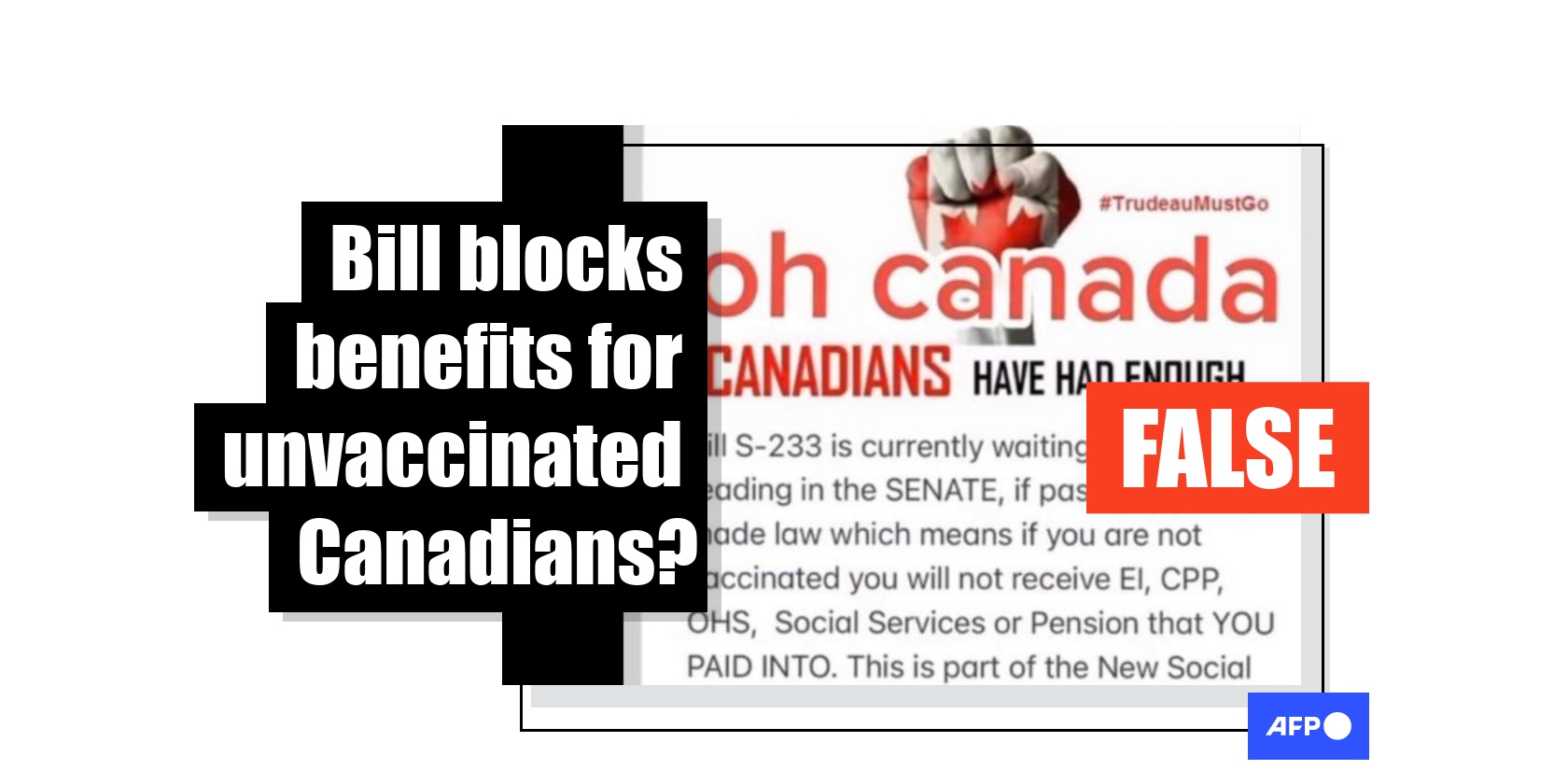
False claims proliferate on Canadian universal basic income bill
- This article is more than two years old.
- Published on May 30, 2023 at 21:46
- 4 min read
- By Gwen Roley, AFP Canada
"Oppose Bill S-233," starts a May 17, 2023 tweet from hockey gold medalist-turned anti-vaccine advocate Theo Fleury. "Senate is about to pass the 3rd reading of this bill which will ban payments of CPP, EI, OAS to unvaxxed Canadians!!!" it warns, referencing Canada's retirement plan (CPP), employment insurance (EI) and Old Age Security pensions (OAS).
Similar claims about the bill were shared in multiple Facebook posts, including one from May 20 warning: "Bill S-233 is currently waiting for third reading in the SENATE, if passed it will be made law which means if you are not vaccinated you will not receive EI, CPP, OHS, Social Services or Pension that YOU PAID INTO."


The posts do not specifically mention Covid-19 vaccinations, but follow a wave of misinformation about the shots.
There is no reference to vaccination status in Bill S-233 (archived here), titled: "An Act to develop a national framework for a guaranteed livable basic income."
Senator Kim Pate, the bill's sponsor, said the legislation was introduced into the Senate of Canada in December 2021 as a way to begin investigating how universal basic income (UBI) could work in Canada.
Pate said that even if the bill is passed, it would not codify UBI into law. It would require the Minister of Finance to study and report on what the specifics of introducing such a benefit in the country could look like.
"This would essentially be a framework bill that wouldn't provide a benefit but would provide a road map of how this could be set up if there was political will to do it," she said.
Pate said there is no provision in the bill which would make it possible to take benefits away from someone based on vaccination status or any other health condition. This is confirmed by searching the text of the bill (archived here).
While Bill S-233 does not include any language stipulating the medical or vaccine status of recipients, there are some social benefits in other countries that do have preconditions, such as the Brazilian Bolsa Familia, which requires parents prove their children are going to the doctor to receive the government childcare transfusion.
Resurfacing of false claims
This is not the first time the legislation has been misrepresented online. In March 2022, Pate and other senators reported they were bombarded with messages and concerns stemming from false claims.
Pate said the speculation about the bill is linked to distrust which grew during the pandemic as vaccine passports were mandated to access some services, including travel on trains and planes.
"There was information about people not having access to services if they didn't get vaccinated and so somehow it got tied up in that whole discussion," she said.
Many of the posts spreading misinformation about Bill S-233 invoke "The Great Reset," a conspiracy theory that claims the World Economic Forum (WEF) and other international actors are attempting to control the population through social policy change.
Users on Facebook also spread the idea that the legislation was tied to backdoor plans to implement digital IDs or force people into SMART cities.
"This will go hand-in-hand with your digital ID, this will go hand-in-hand with how the implement the SMART cities and it will go hand-in-hand with the 40 million boosters Justin Trudeau just ordered," says the speaker in a May 19 Facebook video which received more than 1,000 views.
Government moves to introduce Digital IDs or set up SMART technologies are also falsely targeted online as control techniques. AFP has previously shown the theories are not based in fact.
"Most people, if they read the bill suddenly realize, 'Oh, it doesn't say any of that,'" Pate said.
Prospect of UBI in Canada
Evelyn Forget, a professor of economics at the University of Manitoba, said a UBI program would be a targeted monetary benefit.
"It's a regular transfer of money from government to people -- sufficient to allow them to meet their basic needs," Forget said.
While the bill does not specifically aim to eliminate social programs, Forget said the supplement a universal income could provide could reduce the need for some benefits currently provided to Canadians, including Employment Insurance or the Canada Child Benefit.
"If you think about those programs that already exists, what we're talking about really is trying to expand the same kind of thing to working age adults," she said.
Bill S-233 completed a second reading on April 18, 2023. Senator Pate said it is now awaiting study by the Senate Finance Committee but given other business before the Senate, this likely will not begin until at least fall 2023.
If the Senate votes to pass the bill, this will prompt the Ministry of Finance to start research and present a UBI framework before any related legislation would be introduced in the House of Commons.
More of AFP's reporting on misinformation in Canada can be found here.
Copyright © AFP 2017-2026. Any commercial use of this content requires a subscription. Click here to find out more.
Is there content that you would like AFP to fact-check? Get in touch.
Contact us
